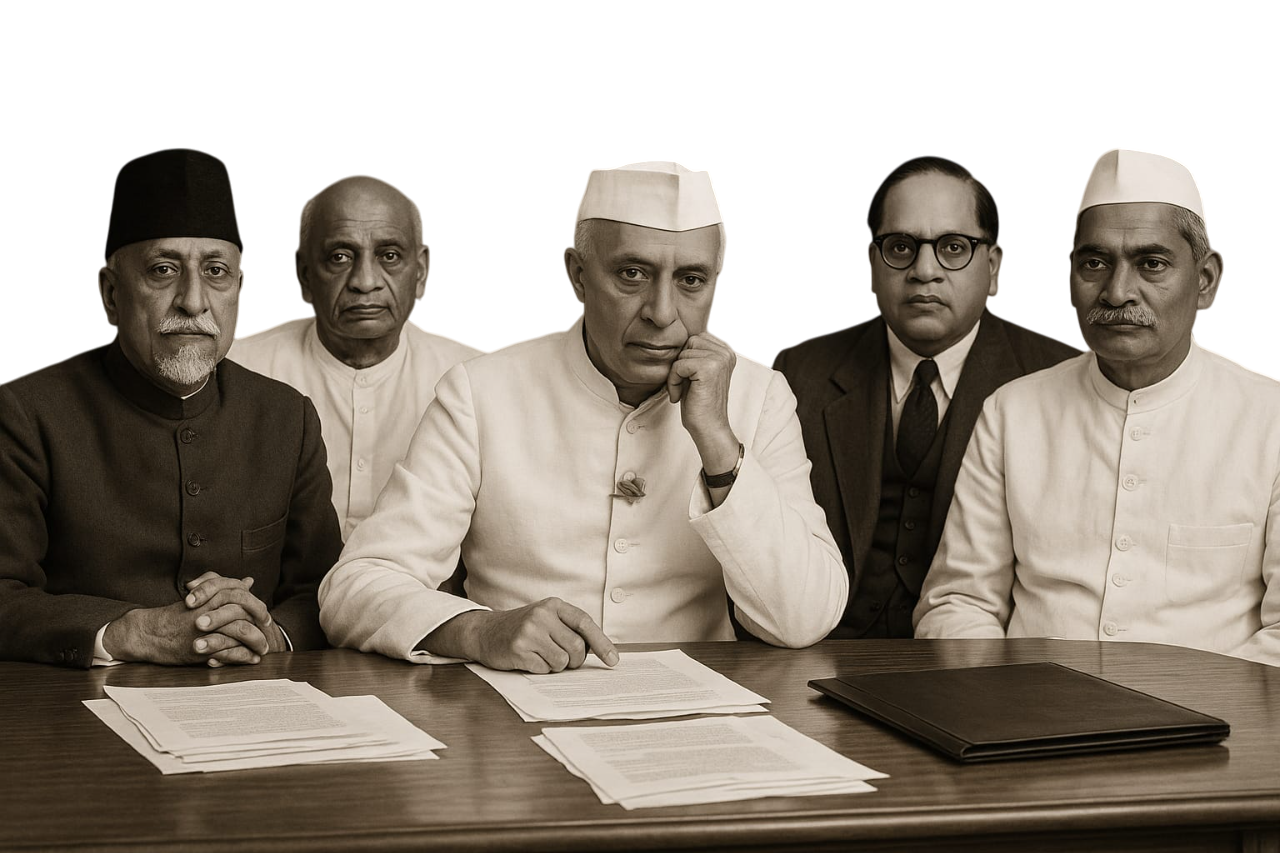| Title | Jawaharlal Nehru's Vision for India: A Nationalist Perspective |
|---|---|
| Author | Azfar Khan |
| Category | Studies about Jawaharlal Nehru |
| Number of Pages | 14 |
| Language | English |
| File Size | 377 KB |
| File Type | |
| Country of Publication | PAKISTAN |
| Main Topics | Abstract, Early Life of Nehru, Entry into Indian Politics, Rise to Leadership, Congress Ministries and the Communal Question, Road to Freedom, Conclusion |
Summary Note of this Document
This 13-page term paper provides a biographical overview of Jawaharlal Nehru (1889–1964), India's first Prime Minister, framed through a nationalist lens. The paper argues that Nehru's prominence in the Indian independence movement was largely boosted by Mahatma Gandhi's mentorship and his father Motilal Nehru's influence, while critiquing Nehru's underestimation of communal (Hindu-Muslim) tensions as a factor contributing to India's 1947 partition. Drawing on sources like Nehru's own writings (An Autobiography and The Discovery of India), biographies by Judith M. Brown and B.N. Pandey, and analyses by Ayesha Jalal, the paper portrays Nehru as a secular, socialist-leaning leader who prioritized modernization but faltered on religious divides.
Structure and Key Sections
- Abstract and Early Life: Introduces Nehru as a key Indian nationalist born into privilege in Allahabad. His education in Britain (Harrow, Cambridge, Inner Temple) exposed him to discrimination, fostering anti-colonial sentiments amid events like the 1905 Bengal Partition. The paper notes his sympathy for the poor, disdain for India's technological backwardness, and alignment with Congress extremists (e.g., Tilak) over moderates like his father.
- Entry into Indian Politics: Nehru returned to India in 1912, joining the Home Rule League (as joint secretary under Motilal). Influenced by Gandhi post-World War I, he participated in the 1920–1922 Non-Cooperation Movement, boycotting British institutions and foreign goods. Despite ideological differences—Nehru favored science and agitation over Gandhi's nonviolence and rural focus—he was arrested multiple times (e.g., 1921 for strikes). In jail, he read extensively, honing his intellectual views.
- Rise to Leadership: As Congress general secretary (1923–1925), Nehru grappled with communal violence and sought socialist solutions during his 1926–1927 Europe trip, admiring aspects of communism while rejecting full adoption. Back in India, he pushed for full independence (Purna Swaraj) against Gandhi's caution, boycotted the Simon Commission, and critiqued the 1928 Nehru Report (authored by Motilal) for settling on dominion status. Nominated Congress president in 1929 to bridge radicals and moderates, Nehru led the 1930 Civil Disobedience Movement (e.g., Salt March), facing repeated imprisonments. He infused socialist ideas into resolutions, advocating free speech, gender equality, progressive taxation, and state control of industries.
- Congress Ministries and the Communal Question: After the 1935 Government of India Act, Congress won 1937 elections and formed ministries in eight provinces. The paper faults Nehru for dismissing communal issues as minor ("looked through a telescope and found nothing"), excluding the Muslim League from coalitions, which fueled "Islam in Danger" rhetoric and League's growth under Jinnah. This "grave miscalculation" alienated Muslims, leading to Congress's 1939 resignation over WWII involvement without consent, and Jinnah's Day of Deliverance.
- Road to Freedom: Nehru's anti-war speeches led to his 1940 arrest. He rejected Jinnah's 1940 Lahore Resolution for Pakistan as "fantastic." The 1942 Cripps Mission failed, prompting the Quit India Resolution and Nehru's longest jail term (1942–1945), during which he wrote The Discovery of India, celebrating Indian culture while criticizing blind imitation of the West. Post-release, elections showed League's Muslim dominance. The 1946 Cabinet Mission Plan for a federal India collapsed over grouping disputes. Amid rising violence, Viceroy Mountbatten (noting Nehru's friendship with his wife Edwina) accelerated partition. Nehru accepted it reluctantly, forcing division of Punjab and Bengal, but the paper views this as his defeat as a territorial nationalist due to mishandling communalism.
- Conclusion: Nehru achieved independence on August 15, 1947, delivering his "Tryst with Destiny" speech, but partition marred his vision. Citing Henry Kissinger's Leadership, the paper classifies Gandhi as a "prophetic" leader (transforming society) and Nehru as a "statesman" (focusing on state-building post-independence). It credits Nehru with alerting India to global struggles, ruling until 1964 as a non-aligned leader, though his freedom struggle role is deemed secondary to Gandhi's.
 |
Overall Tone and Critique
The paper is critical from a Pakistani perspective, emphasizing Nehru's "miscalculations" on communalism (e.g., 1937 exclusions, Cabinet Mission rejection) as pivotal to partition, while acknowledging his contributions to nationalism, socialism, and modernization. It highlights his jail-time productivity and ideological evolution but portrays him as "piggybacked" by Gandhi, not a fully independent force. The bibliography includes 13 sources, blending Indian, Pakistani, and Western viewpoints.
Click on the options below to read the full article.
×
